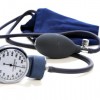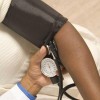High blood pressure, or hypertension, can cause serious health problems. It makes your heart work harder and can damage your blood vessels even if you feel okay. Everyone should have their blood pressure checked regularly. If you have certain risk factors, you are more likely to have high blood pressure. This 6-page fact sheet is a major revision that discusses risk factors and ways to reduce risk. Written by Linda B. Bobroff, and published by the UF/IFAS Department of Family, Youth and Community Sciences, revised November 2017.
http://edis.ifas.ufl.edu/fy305
Tag: Hypertension (High Blood Pressure)
Living Well to Keep Your Pressure Down (FCS8690/FY305)
 High blood pressure, or hypertension, can cause serious health problems. It makes your heart work harder and can damage your blood vessels even if you feel okay. Everyone should have their blood pressure checked regularly. If you have certain risk factors you are more likely to have high blood pressure. Follow these recommendations to help reduce your risk for high blood pressure. This 6-page fact sheet was written by Linda B. Bobroff, and published by the UF Department of Family Youth and Community Sciences, January 2013.
High blood pressure, or hypertension, can cause serious health problems. It makes your heart work harder and can damage your blood vessels even if you feel okay. Everyone should have their blood pressure checked regularly. If you have certain risk factors you are more likely to have high blood pressure. Follow these recommendations to help reduce your risk for high blood pressure. This 6-page fact sheet was written by Linda B. Bobroff, and published by the UF Department of Family Youth and Community Sciences, January 2013.
http://edis.ifas.ufl.edu/fy305
High Blood Pressure: What You Need to Know (FCS8638/FY199)
 High blood pressure, also called hypertension, increases your health risks. If you have high blood pressure, you have a higher chance of getting heart disease or kidney disease or of having a stroke. This 4-page fact sheet was written by Linda B. Bobroff, and published by the UF Department of Family Youth and Community Sciences, October 2012.
High blood pressure, also called hypertension, increases your health risks. If you have high blood pressure, you have a higher chance of getting heart disease or kidney disease or of having a stroke. This 4-page fact sheet was written by Linda B. Bobroff, and published by the UF Department of Family Youth and Community Sciences, October 2012.
http://edis.ifas.ufl.edu/fy199
